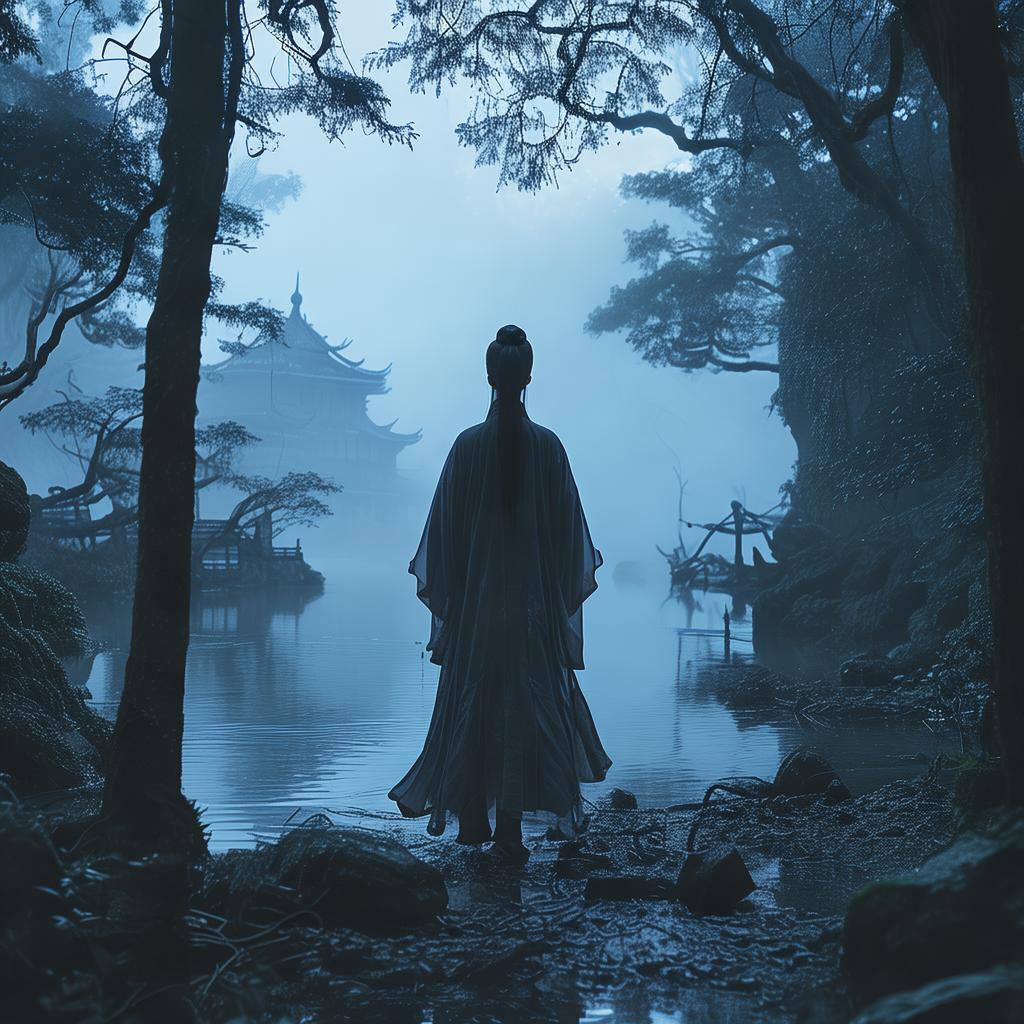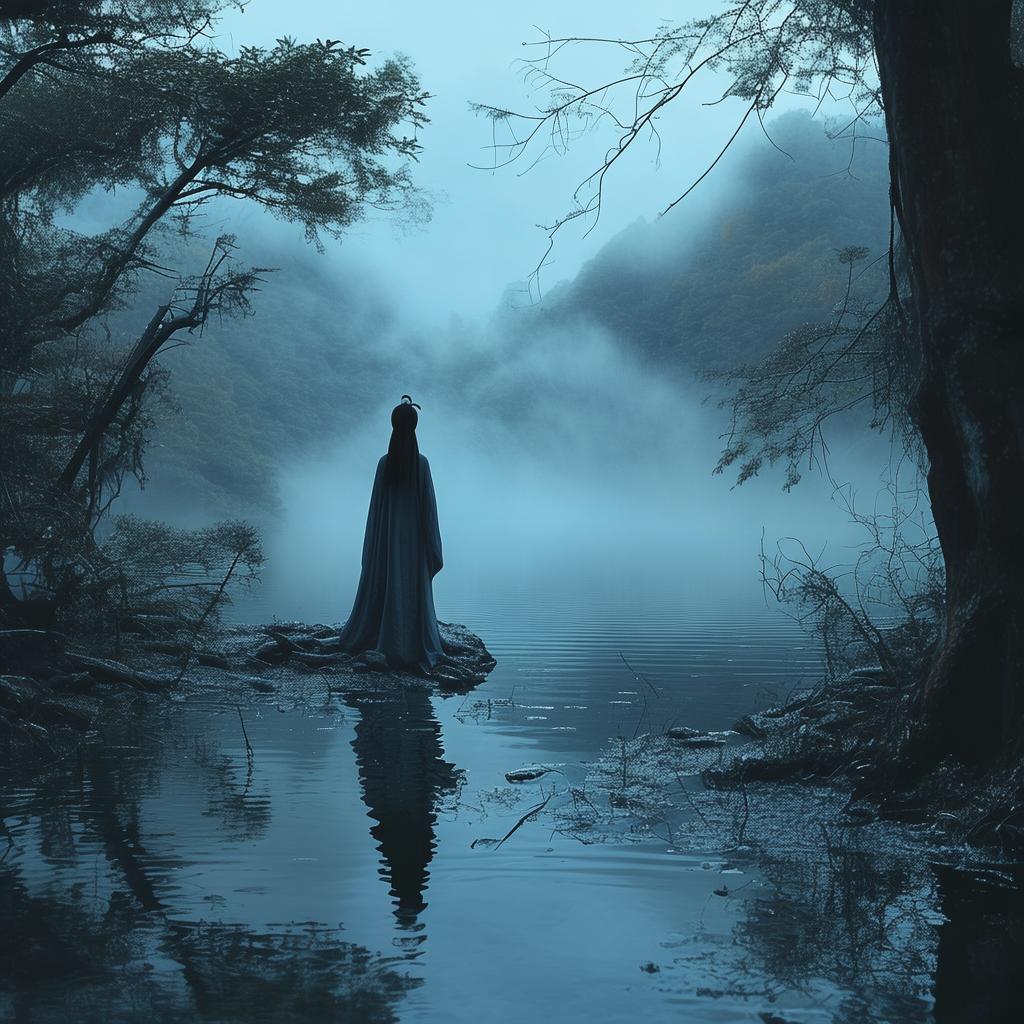The Labyrinth of the Living Dead
In the ancient city of Liaozhai, where the boundaries between the living and the dead were as thin as the veil of mist that often shrouded the streets, there lived a young scholar named Lin. His name was Lin Wenyuan, and he was known for his insatiable curiosity and his unwavering belief in the existence of the supernatural. It was this belief that led him to the enigmatic tales of Wang Liu Lang, a philosopher whose reflections on the nature of reality had left an indelible mark on the minds of those who dared to read them.
One fateful evening, as the moon hung low and the stars twinkled like distant eyes, Lin found himself in the labyrinthine depths of the city's old library. There, amidst the musty tomes and ancient scrolls, he stumbled upon a peculiar book bound in the skin of a raven. The title, "The Philosophical Reflections of Wang Liu Lang," intrigued him, and he knew that this was no ordinary volume.
As Lin opened the book, he was transported into the mind of Wang Liu Lang, who had once wandered the same labyrinthine streets of Liaozhai. In the pages, Wang described a world where the living and the dead coexisted in a delicate balance, and where the nature of reality was as fluid as the very essence of existence itself. It was a world where the dead were not merely the departed, but entities that lingered, their existence a reflection of the living's own mortality.
Lin was captivated by Wang's musings, and he found himself drawn to the labyrinth that Wang had described. It was a place where the dead walked the earth, not as ghosts, but as living, breathing beings, their presence a testament to the interconnectedness of life and death. It was a place where the boundaries between the two were not fixed, but constantly shifting, and where the nature of reality was a question that could only be answered by those who dared to venture into the labyrinth.
Determined to uncover the truth about reality, Lin set out to find the labyrinth. He traveled through the winding streets of Liaozhai, his mind a whirlwind of questions and doubts. Along the way, he encountered strange creatures and mysterious figures, each with their own story and their own place in the grand tapestry of existence.
One such figure was an old woman who claimed to be the guardian of the labyrinth. Her eyes, deep and knowing, seemed to pierce through Lin's very soul. "You seek the labyrinth," she said, her voice a whisper that carried the weight of ages. "But know this: it is not a place to be entered lightly. The labyrinth is a mirror, and it will show you the truth about yourself."
Lin pressed on, driven by a sense of purpose that he could not quite articulate. He reached the entrance of the labyrinth, a grand archway that seemed to beckon him forward. As he stepped through, the world around him changed. The air grew colder, the light dimmer, and the sounds of the city faded into a distant echo.
Inside the labyrinth, Lin found himself in a vast, echoing chamber. The walls were lined with ancient runes, their meanings lost to time. In the center of the chamber stood a pedestal, upon which rested a single, glowing crystal. It was this crystal that held the key to the labyrinth, and to the truth that Lin sought.
As he reached out to touch the crystal, Lin felt a surge of energy course through him. The labyrinth around him began to shift, the walls moving and changing, revealing new paths and new challenges. He was not alone in his quest; the living dead, once silent observers, now moved among him, their presence a reminder of the delicate balance between life and death.
Lin navigated the labyrinth with care, each step a step closer to the truth. He encountered figures from his own past, both living and dead, each one a reflection of his own life and his own choices. He saw the mistakes he had made, the paths he had chosen, and the consequences that followed.
Finally, Lin reached the heart of the labyrinth, where the crystal pulsed with a life of its own. As he touched it, a vision unfolded before him. He saw the world as it truly was, not as a series of separate events, but as a single, interconnected whole. He saw the living and the dead as two sides of the same coin, each essential to the other's existence.

The vision was overwhelming, and for a moment, Lin was lost to it. But then, he realized that this was the truth he had been seeking. The nature of reality was not a fixed thing, but a fluid, ever-changing tapestry that was woven from the threads of life and death.
With a newfound understanding, Lin stepped back from the crystal. The labyrinth around him began to fade, and he found himself back in the library, the book closed and the raven-skin cover cradled in his arms. He knew that his journey was not over, but that he had taken the first step toward understanding the true nature of reality.
As Lin left the library, the city of Liaozhai seemed different to him. The living and the dead moved together in a harmonious dance, each one a part of the greater whole. He had found the truth, and with it, a sense of peace and purpose that he had never known before.
The Labyrinth of the Living Dead was not just a story of a young scholar's quest for truth, but a reflection on the nature of reality itself, a reminder that the boundaries between life and death are not as clear-cut as we might believe, and that the true nature of existence is a mystery that we are all invited to explore.
✨ Original Statement ✨
All articles published on this website (including but not limited to text, images, videos, and other content) are original or authorized for reposting and are protected by relevant laws. Without the explicit written permission of this website, no individual or organization may copy, modify, repost, or use the content for commercial purposes.
If you need to quote or cooperate, please contact this site for authorization. We reserve the right to pursue legal responsibility for any unauthorized use.
Hereby declared.









